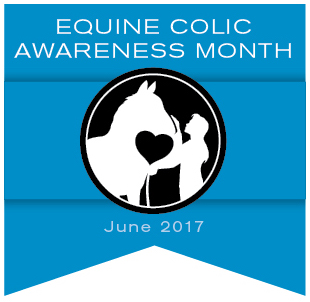While colic can be frightening for both owner and horse, with early detection and proper medical care a horse’s chance for survival is very high. When you recognize the warning signs and symptoms of colic in your horse, or even if you just have a “gut-feeling” that you horse is colicking, call your veterinarian immediately.
Your veterinarian is best trained and equipped to diagnosis and treat colic, as this procedure will involve a thorough 10-point examination of the entire horse. After assessing the problem, your vet will manage your horse’s pain and determine the best course of treatment for the cause behind your horse’s colic.
Pain Management
Colic varies greatly in terms of its severity. In most cases, colic is idiopathic and medically treatable at the farm and more extreme measures such as surgery are unnecessary. Your veterinarian may first treat your horse with a round of non-narcotic analgesics (pain relief medication) to combat the discomfort your horse is feeling. Flunixine megulimine (Banamine )is a popular choice of drug, as it not only relieves pain but also helps to break a fever.
Sedatives and tranquilizers are generally not recommended for treatment; these drugs may adversely affect the practitioner’s ability to properly diagnose the severity and location of the colic. They mask the pain and decrease the heart and respiratory rates, which are key indicators of the severity of the horse’s pain.
Flushing
After managing your horse’s pain, your vet will likely flush its entire gastrointestinal tract with a gallon or more of mineral oil. This may help break up an impaction or move it through the horse’s system, alleviating the blockage. If mineral oil is not sufficient, another form of laxative may be used to help ease the obstruction through the horse’s colon. Electrolytes may also be used in the flush to help restore balance to your horses’s system.
Keep in mind that flushing a horse’s system to break up the blockage so it can pass is treating the symptom, not the cause. The problem that caused the impaction, whether it’s dietary or environmental, impaction colic is likely to rear its ugly head again.
Surgery
In the most severe case of colic, surgery may be required. Your veterinarian will make the decision on whether or not surgery is needed based on the cause behind your horse’s colic and amount of pain the horse is in. Horses still exhibiting great pain after the administration of preliminary medicines are more likely to need surgery, as the root cause of their colic is probably a large obstruction or torsion.
Prompt action is vital and the decision to operate must be made swiftly, as a blockage or torsion may cause a lack of blood flow to the horse’s organs. Cutting off the blood supply causes necrotic (dead) tissue and it must be removed and fixed immediately, or this type of injury quickly becomes lethal to the horse.
Remember that these treatments only stop a colic episode – they do not address what caused it to begin with. In over 80% of colic cases, we and our vets have no idea where and why they originate. Learn what you can do to reduce your horse’s risk for colic in the future.






